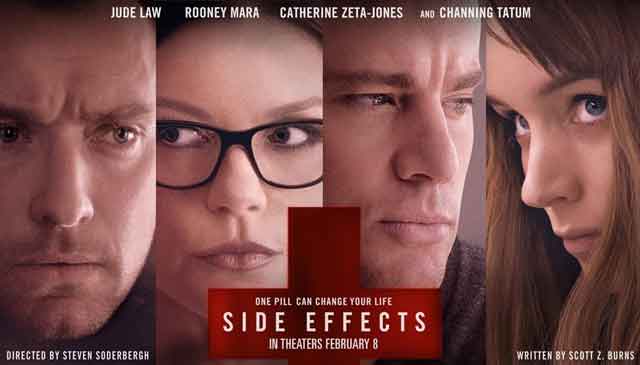
If director Steven Soderbergh really means to retire from making movies after Side Effects, he leaves Hollywood behind on a high. His latest and supposedly last theatrical feature is Prozac laced with arsenic, a deadly cocktail that courses through the blood like a slow poison.
Like many of Soderbergh’s best films — Traffic, Out of Sight, The Limey, Contagion — Side Effects is a genre flick seen through the lens of an art-house auteur. The film is at once a clinically efficient suspense movie that borrows from Alfred Hitchcock and Brian De Palma, and a thoughtful meditation on the ills that plague an over-medicated, consumption-fuelled society.
Side Effects introduces us to Emily Taylor (played by Rooney Mara), the suicidal wife of a young Wall Street investment banker (Channing Tatum) jailed for insider trading. When husband Martin is released from prison, Emily’s depression takes a turn for the worse, and she tries to kill herself.
Her assigned psychiatrist Jonathan (Jude Law) prescribes a new wonder drug called Ablixa in an attempt to bring her symptoms under control. The less you know about what happens next the better, but it’s enough to stay that Side Effects smoothly shifts gears and flips genres several times during its duration.
Side Effects reunites Soderbergh with screenwriter Scott Z Burns, who also penned his recent films, The Informant and Contagion. The script is a crafty exercise in misdirection, taking unexpected turns in its plot, toying with the audience’s sympathy for its characters, and eventually arriving at surprising conclusions about who is really at fault — and what is really wrong — in contemporary America.
The themes may be hefty — the implications of using the language of medicine in the treatment of unhealthy behaviour, whether the mental illness of a person can be separated from the maladies of the society he lives in — but Side Effects is also cracking entertainment.
Side Effects trailer (via YouTube):
Much of the quiet power of Side Effects comes from the subtle, underplayed performances turned in by its lead actors. Rooney Mara is as good here as she was for David Fincher in her brief, film-stealing scene in The Social Network and her lead role in The Girl with the Dragon Tattoo. Through the buttoned-up intensity of her performance, we see hints of the dark interior life beneath Emily’s apparent lethargy and blunted emotion.
Law is as slippery as the compromised, money-motivated shrink that treats Emily as he was as a slimy blogger in Contagion. Tatum and Catherine Zeta-Jones, who have also both worked with Soderbergh in recent years, play their smaller parts with an understated competence that works well in an austere controlled film.
Side Effects, like many of Soderbergh’s films, will test impatient viewers with its glacial pacing and even colder emotional tone. Others will (with good reason) find its exposition-heavy climax to be clumsy and improbable. But whatever flaws Side Effects has, it’s the sort of serious-minded and director-driven film that is becoming increasingly rare in the Hollywood mainstream.
Soderbergh reckons that such films are disappearing because their audience has migrated to television. The lukewarm box-office reception for Side Effects indicates that he might be right. He had to make his most recent film — the Liberace biopic Behind the Candelabra — for HBO because no film studio saw it as a commercially viable project. Little wonder that Soderbergh has decided to surrender the multiplex to the teenagers and the superheroes. — (c) 2013 NewsCentral Media
- Read more: Steven Soderbergh’s state of cinema talk




